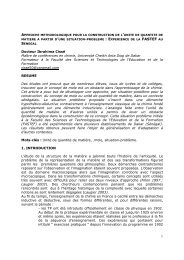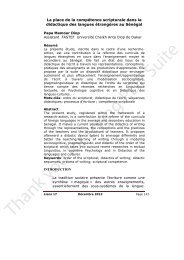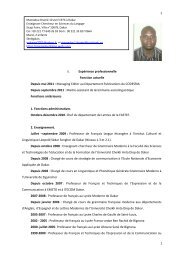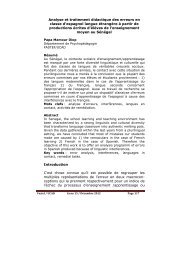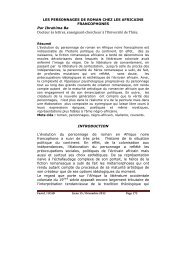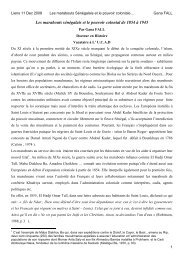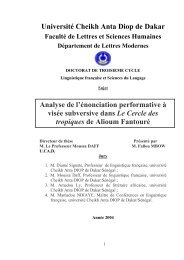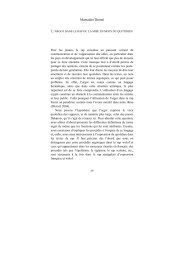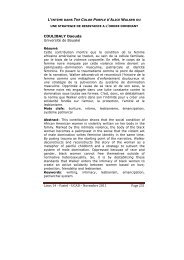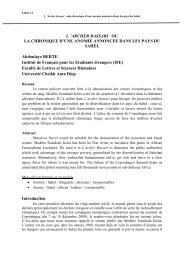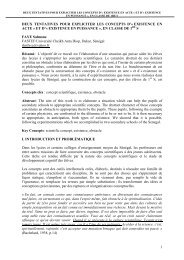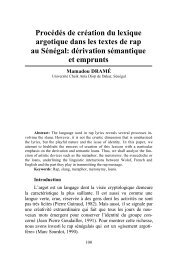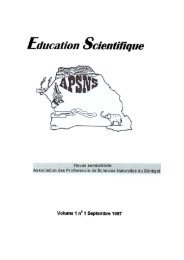Références bibliographiques - Fastef - Université Cheikh Anta Diop
Références bibliographiques - Fastef - Université Cheikh Anta Diop
Références bibliographiques - Fastef - Université Cheikh Anta Diop
You also want an ePaper? Increase the reach of your titles
YUMPU automatically turns print PDFs into web optimized ePapers that Google loves.
BIBLIOGRAPHIE<br />
Abric, J.-C., Vacherot, G. (1976). Méthodologie et étude expérimentale des représentations<br />
sociales: tâche, partenaire et comportement en situation de jeu. Bulletin de Psychologie, 29, 63-<br />
71.<br />
Abric, J.-C. (1987). Coopération, compétition et représentations sociales. Cousset: Delval.<br />
Abric, J-C. (1994). (sous la direct.). Pratiques sociales et représentations. Paris: PUF.<br />
Abric, J.-C. (1996). Psychologie de la communication: théories et méthodes. Paris: Colin.<br />
Adamkiewicz, W. (1997). Necessary changes in the universities development strategy<br />
connected with the service sector domination in the global economy. Proceedings of the<br />
International Conference "Mission and Strategy of a University", Technical University of<br />
Gdansk, 17-19 september, 99-123.<br />
Perking H. (1996). The Third Revolution - Professional Elits in the Modern World. London :<br />
Routledge.<br />
Anderson, J. R. (1976). Langage, Memory and thought. Hilldale, NJ: Erlbaum.<br />
Anderson, J. R. (1983a). The architecture of cognition. Cambridge, Massachussets : Havard<br />
University Press.<br />
Anderson, J. R. (1983b). A spreading activation theory of memory. Journal of Verbal Learning<br />
and Verbal Behaviour, 22, 261-295.<br />
Anderson, J. R. (1985). Cognitive psychology and its applications, 2nd edition. San Francisco :<br />
W.H. Freeman.<br />
Anderson, J.R. (1993a). Problem solving and learning. American Psychologist, 48, 35-44.<br />
Anderson, J.R. (1993b). Rules of the mind. Hillsdale, NJ: Lawrence Erlbaum.<br />
Anderson, J.R. (1996). ACT. A simple theory of complex cognition. American Psychologist,<br />
51, 355-365.<br />
Anderson, J.R., Corbett, A.T., & Lewis, M.W. (1990). Cognitive tutors : Lessons learned.<br />
Journal of the Learning Sciences, 4, 167-207.<br />
Altet, M., Britten, J.D. (1983). Micro-enseignement et formation des enseignants. Paris : PUF.<br />
Altet, M. (1998). Les pédagogies de l'apprentissage (2 ème éd.). Paris : PUF.<br />
Arsac, G., Develay, M., Tiberghien, A. (1989). La transposition didactique en mathématiques,<br />
en physique et en biologie. Lyon: IREM/LIRDIS).<br />
Astolfi, J-P. & Develay, M. (1989). La didactique des sciences. Paris: PUF.
Astolfi, J-P. (2001). Qui donc n'est pas constructiviste ? Actes du Colloque International :<br />
Constructivismes : usages et perspectives en éducation. Uni-Mail, Genève, 4-8 septembre 2000,<br />
113-127.<br />
Atkinson, R.C. & Shiffrin, R.M. (1968). Human memory: A proposed system and its control<br />
processes. In K.W. Spence & J.T. Spence (Eds.), The psychology of learning and motivation,<br />
Vol. 2. London.<br />
Atkinson, R. C., Atkinson, R. M., Smith, E. E., Hilgard, E.R. (1987). Introduction à la<br />
psychologie, 2ème éd. Paris: Vigot-Etudes vivantes.<br />
Ausubel, D. P. (1960). The use of advance organisers in learning and retention of meaningful<br />
verbal material. Journal of educational psychology, 51.<br />
Ausubel, D. P. (1968). Educational psychology: a cognitive view. New York, Holt, Rinehart &<br />
Winston.<br />
Baars, B.J. (1986). The cognitive revolution in psychology. New York : Guilford Press.<br />
Bachelard, G. (1938). La formation de l'esprit scientifique. Paris: Vrin. 12è Edition.<br />
Bardin, L. (1977). L'analyse de contenu. Paris: PUF.<br />
Bartelett, F. C. (1932). Remembering: A study in experimental and social psychology.<br />
Cambridge: Cambridge University Press.<br />
Bastien, G. (1987). Schèmes et stratégies dans l'activité cognitive de l'enfant. Paris: PUF.<br />
Bloom, B.S. et coll. (1979). Taxonomie des objectifs du domaine cognitif. Québec : Presses de<br />
l'université du Québec.<br />
Bloom, B. & al. (1969). Taxonomie des objectifs pédagogiques. Montréal: Education Nouvelle.<br />
Bonnet, C., Hoc, J.-M., Tiberghien, G. (1986). Psychologie, intelligence artificielle et<br />
automatique. Bruxelles : Mardaga.<br />
Bourgeois, E. (1996). L'analyse structurelle: une méthode d'analyse de contenu pour les<br />
sciences humaines. Bruxelles: De Boeck <strong>Université</strong>.<br />
Boutinet, J.-P. (1990). Anthropologie du projet. Paris: PUF.<br />
Brandsford, J.D. & Stein, B.S. (1984). The IDEAL problem solver. New York : W.H. Freeman.<br />
Brien, R. (1991). Sciences cognitive et formation. Silery, Québec: Presses Universitaires du<br />
Québec.<br />
Broadbent, D.E. (1958). Perception and communication. London: Pergamon Press.<br />
Broadbent, D. E. (1975). The magical number seven after fifteen years. In R. A. Kennedy and<br />
A. Wilkes, eds., Studies in Long-term Memory. New York: Wiley.<br />
Brousseau, G. (1983). Les obstacles épistémologiques et les problèmes en mathématiques.<br />
Recherches en didactique des mathématiques, 4(2), 165-198.<br />
Brown, J. A. (1958). Some tests of the decay theory of immediate memory. Quartely<br />
Journal of Experimental Psychology, 10, 12-21.
Brown, J. S., Carr, T. S. (1988). Adapting to processing demands in discourse production: The<br />
case of handwriting. Journal of Experimental Psychology: Human perceptionn and<br />
performance, 14, 45-59.<br />
Bruner, J. S., Goodnow, J. J., Autin, G. A. A. (1956). A study of thinking. New York: Wiley&<br />
sons.<br />
Bruner, J. S. (1966). Toward a theory of instruction. Cambridge, Massachussetts, Harvard<br />
University Press.<br />
Bruner, J. S. (1991). Car la culture donne forme à l'esprit. Paris: Eshel.<br />
Bruner, J. S. (1996). L'éducation, entrée dans la culture. Paris: Retz.<br />
Bruning, J. L., Kintz, B. L. (1968). Computationnal Handbook of Statistics. Scott, Foresman<br />
and Company.<br />
Bugéréré, S. (1998). La résolution des problèmes de mécanique par les élèves du secondaire :<br />
l'impact des connaissances conditionnelles dans le processus de résolution. Thèse de Doctorat<br />
en Sciences de l'Education. Louvain-La-Neuve: UCL. Document inédit.<br />
Caillot, M. (1984). La résolution de problème en physique : représentations et stratégies. Revue<br />
Française de Pédagogie, Vol. 3/4, 29, 257-262.<br />
Caillot, M., Dumas-Carré, A. Goffard, M. (1988). PROPHY: une méthode pour résoudre des<br />
problèmes de physique. LIREST. Paris : <strong>Université</strong> de Paris VII.<br />
Caillot, M., Dumas-Carré, A. & Goffard, M. (1990). Le diagramme objets-interactions. Bulletin<br />
de l'Union des Physiciens, 722, 353-373.<br />
Caillot, M., Raisky, C. (1996). La didactique au-delà des didactiques. Débats autour de<br />
concepts fédérateurs. De Boeck <strong>Université</strong>.<br />
Campbell, D., Stanley, J. (1963). Experimental and quasi experimental design for research.<br />
Skokie. IL: Rand Mc Nally.<br />
Chevallard, Y. (1986). La transposition didactique. Grenoble : La Pensée Sauvage.<br />
Chi, M. T. H. & al. (1981). Categorisation and representation of physics problems by experts<br />
and novices. Cognitive Sciences, 5, 121-152.<br />
Chi, M. T. H. & al. (1982). Expertise in Problem solving. In R. Sternberg (Ed), Advances in<br />
psychology of Human Intelligence. Hillsdale, Erlbaum.<br />
Chomsky, N. (1957). Syntactic strucrures. The Netherlands : Mouton.<br />
Chomsky, N. (1959). Review of Skinner's "Verbal Behavior". Langage, 35, 26-58<br />
Chomsky, N. (1965). Aspects of the theory of syntax. Cambridge, MA : MIT Press.<br />
Cissé, D. (2000). Conception et experimentation d'une typologie de problème. Travail de<br />
recherche en éducation. Département de Physique et Chimie, Ecole Normale Supérieure de<br />
Dakar. Document inédit.
Collins, A. M. & Loftus, E. F. (1975). A spreading-activation theory of semantic processing .<br />
Psychological Review, 82, 407-428.<br />
Collins, A. M. & Quillian, M. R. (1969). Retrieval time for semantic memory. Journal Verbal<br />
Learning and Verbal Behavior, 8, 240-248.<br />
Covington, M. C., Crutchfield, R. S., Davies, L. B., Olton, R. M. (1974). The Productive<br />
Thinking Program : A course on learning to think. Colombus, Ohio: Charles E. Merril.<br />
Crahay, M., Lafontaine, D. (1986). L'art et la science de l'enseignement : Bruxelles : Labor<br />
Crowder, R. G. (1976). Principles of Learning and Memory. Hillsdale, N.J. : Erlbaum<br />
Associates.<br />
Darwin, G. J., Turvey, M. T. & Crowder, R. G. (1972). AN auditory analogue of the Sperling<br />
partial report procedure: Evidence for brief auditory storage. Cognitive Psychology, 3, 255-267.<br />
De Bono, E. (1973). CoRT thinking materials. London: Direct Education Services.<br />
De Cock, G. (1996). Analyse de la démarche de résolution de problèmes mathématiques chez<br />
dix-huit sujets de 1ère Candidature. Pédagogies, 11, 61-70.<br />
De Corte, E. (1990). Les fondements de l'action didactique, 2 ème Ed. De Boeck <strong>Université</strong>.<br />
D'Hainaut L. (1977). Des fins aux objectifs de l'éducation. Paris, Bruxelles : Nathan Labor.<br />
De Ketele, J-M. (1984). Observer pour éduquer. Berne : Peter Lang.<br />
De Ketele, J-M. & Rogiers, X. (1993). Méthodologie du recueil d'informations. Fondements<br />
des méthodes d'observation, de questionnaires, d'interviews et d'étude de documents. Collection<br />
Pédagogies en développement. Bruxelles : Edition De Boeck.<br />
De Ketele, J-M. (1986). L'évaluation, approche descriptive ou prescriptive. De Boeck-<br />
Wesmael, Bruxelles.<br />
Delahaye, J.-P. (1987). Systèmes experts: organisation et programmation des bases de<br />
connaissance en calcul propositionnel. Paris: Eyrolles.<br />
De Landsheere, L. et Delandsheere, V. (1975). Définir les objectifs de l'éducation. Paris: PUF.<br />
Denis, M., Dubois, D. (1976). La représentation cognitive. Année Psychologique, 76, 541-562.<br />
Deutsch, D. (1987). Auditory pattern recognition. In K. R. Boff, L. Kaufman, & J. P. Thomas<br />
(Eds.), Handbook of perception and human performance. Vol. 2: Information processing (32-<br />
55). New York: Wiley<br />
De Vecchi, G. (1992). Aider les élèves à apprendre. Paris: Hachette Education.<br />
Doise, W.& Mugny, G. (1981). Le développement social de l'intelligence. Paris: InterEditions.<br />
Doise, W. (1989b). Cognition et représentations sociales: l'approche génétique. In. D. Jodelet<br />
(Ed.), Les représentations sociales. Paris: PUF (pp. 341-362).<br />
Doise, W. (1991). System and Metasystem in cognitive operations. In: Learning and<br />
Instruction. European Research in International Context. Vol.3, 125-139, Oxford: Pergamon<br />
Press.
Doise, W, Clemence, A., Lorenzi-Cioldi, F. (1992). Représentations sociales et analyse de<br />
données. Grenoble: Presses Universitaires de Grenoble.<br />
Donella et al. (1992). Beyond the Limits. Global Collapse or a Sustainable Future. Earthcan<br />
Publications Ltd. London.<br />
Drucker, P. (1993). Post Industrial Society. Oxford: Buttleworth Heinemann.<br />
Dumas-Carre, A., Caillot, M., Martinez Torregrosa, J., Gil, D. (1989). Deux approches pour<br />
modifier les activités de résolution de problème en physique dans l'enseignement secondaire:<br />
une tentative de synthèse. Aster, 8, 135-160, Paris: INRP.<br />
Dumas-Carré, A. (1987). La résolution de problème en physique, au lycée; le procédural:<br />
apprentissage et évaluation. Thèse d'Etat, <strong>Université</strong> Paris VII.<br />
Dumas-Carre, A., Goffard, M. (1997). Rénover les activités de résolution de problème en<br />
physique. Concepts et démarches. Paris: Armand Collin.<br />
Ebbinghaus, (1913). Memory: A contribution to experimental psychology. New York:<br />
Columbia Teacher's College.<br />
Eysenck, M.W. , Keane, M.T. (1990). Cognitive Psychology. A Student's Handbook. Laurence<br />
Erlbaum Associates Ltd., Publishers.<br />
Fenstermacher, G., D. (1986). Philosophy of research on teaching: Three aspects. In M. C.<br />
Wittrock (Ed.), Hanbook of research on teaching (3 rd ed.), 37-49, New York: Macmillian.<br />
Flament, C. (1986). L'analyse de similitude: une technique pour les recherches sur les<br />
representations sociales. In. W. Doise et A. Palmonari (Eds.), L'étude des representations<br />
sociales (pp. 139-156), Paris, Delachaux et Niestlé.<br />
Feuerstein, R., Rand, Y., Hoffman, M. B. & Miller, R. (1980). Instrumental enrichment : an<br />
intervention program for cognitive modifiability : theory and practice. In J.W. Segal, S.F.<br />
Chipman, R. Glaser (Eds) : Thinking and learning skills. Vol. 1. Relating instruction research.<br />
Freud, S. (1925). Sigmund Freud présenté par lui-même, 1ère Ed.. Paris: Gallimard.<br />
Freud, S. (1988). Introduction à la psychanalyse, nouvelle Ed. Paris: Payot<br />
Forquin, J-C, (1996). Ecole et culture. Le point de vue des sociologues britanniques. De Boeck<br />
<strong>Université</strong>.<br />
Fourez, G. (1998). La construction des sciences. Bruxelles : de Boeck <strong>Université</strong>.<br />
Fraisse, P. & Piaget, J. (1963). Traité de psychologie. Paris: PUF.<br />
Gagné, R.M. (1970). The condition of learning. New York, Holt : Rinehart and Winston.<br />
Gagné, E.D. (1985). The cognitive psychology of school learning. Boston, Toronto : Little<br />
Brown Company.<br />
Gallagher, J.J. (1991). Prospective and practicing secondary science teachers' knowledge and<br />
beliefs about the philosophy of science. Science Education, 75, 121-173.<br />
Gardner, H. (1993). Histoire de la revolution cognitive. Paris: Payot.
Geary, D. C., Widaman, K.F. (1987). Individual differences in cognitive arithmetic. Journal of<br />
Experimental Psychology: General, 116, 154-171.<br />
Gibbons, M. (1994). The Production Knowledge. The Dynamics of Science and Reasearch in<br />
Contemporary Societies. Sage Publications; London.<br />
Gick, M. L. & Holyoak, K. J. (1983). Schemata Introduction and analogical transfer: Cognitive<br />
Psychology, 15, 1-38.<br />
Gillepsie, D. (1992). The Mind's We: Contextualism in Cognitive Psychology. Carbonale:<br />
Southern Illinois University Press.<br />
Gil Perez, D. & Carrascosa, J. (1990). What to do about " misconceptions" ? , Science<br />
Education , vol. 74, 5, 531-540.<br />
Gil Perez, D., Martinez-Terregrosa, J. (1983). Problem solving in physics : a critical analysis.<br />
Premier atelier international de recherche en didactique de la physique à la Londes-les-Maures.<br />
Paris : CNRS, 289-296.<br />
Gil Perez, D. Martinez Torregrosa, J., Senet Perez, F., (1987). "La résolution de problème<br />
comme activité de recherche: un instrument de changement conceptuel et méthodologique. Petit<br />
X, 1415, 25-38.<br />
Gil Perez, D. (1996). New trends in science education. International Journal of Science<br />
Education, 18, 8, 889-901.<br />
Giordan, A., De Vecchi, G. (1987). Les origines du savoir des conceptions des apprenants aux<br />
concepts scientifiques. Neuchâtel, Suisse : delachaux & Niestle.<br />
Giordan, A. (sous la direction de). (1994). L’élève et/ou les connaissances scientifiques. Bern :<br />
Peter Lang.<br />
Giordan, A. (1998). Une didactique pour les sciences expérimentales. Belin.<br />
Glover, J. L., Kintz, B. L. (1968). Computationnal handbook of statistics. Glenview (Illinois):<br />
Scott, Foresman and company.<br />
Glover, J. A. & Ronning, R. R. (Eds). (1987). Historical foundation of educationnal<br />
psychology. New York : Plenum.<br />
Glover, J. A. & al. (1990). Cognitive psychology for teachers. New York : Macmillian<br />
Publishing Company.<br />
Goffard, M. (1994). Le problème de physique et sa pédagogie. Paris: ADAPT.<br />
Greco, P., Piaget, J. (1959). Apprentissage et connaissance. Paris: PUF.<br />
Greeno, J. G. (1977). Process of understanding in problem solving. In. N. J. Castellan, Jr., D. B.<br />
Pisoni & G. R. Potts (Eds.), Cognitive theory (Vol. 2, pp. 43-54), Hillsdale, NJ: Erlbaum.
Harnad,S., Skinner, B.F. et al. (1988). The selection of behavior : the operant behaviorism of<br />
B.F. Skinner : comments and consequences . /Ed. by Charles Catania and Stevan Harnad.<br />
Cambridge : Cambridge University Press.<br />
Halbwachs, F. (1974). La pensée physique chez l'enfant et le savant. Neuchâtel: Delachaux et<br />
Niestle.<br />
Hameline, D. (1976). Formuler des objectifs pédagogiques : mode passagère ou voie d'avenir ?<br />
Cahiers Pédagogiques, 148-149.<br />
Hameline, D. (1991). Les objectifs pédagogiques en formation initiale et en formation continue<br />
(9 ème éd.). Paris : ESF Editeur.<br />
Hashweh, M. Z. (1996). Effects of Science Teachers' Epistemological beliefs in Teaching.<br />
Journal of Research in Science Teaching. 33, 1, 47-63.<br />
Heller, J., Rief, F. (1984). Prescriving effective human problem solving: problem description in<br />
physics. Cognition and instruction, I(2), 177-276.<br />
Hempel, C. G. (1972). Eléments d’épistémologie. Paris: Collin.<br />
Hirst, P. et Thomson, G. (1996). Globalisation in Question. Cambridge : Policy Press.<br />
Houziaux, M.-O. (1972). Vers l'enseignement assisté par ordinateur. Paris: PUF.<br />
Holyoak, K. J. (1985). The pragmatics of analogical transfer. In. G. H. Bower (Ed.), The<br />
psychology of learning and motivation, 9, (pp. 59-87). New York: Academy Press.<br />
Howell, D. C. (1998). Méthodes statistiques en sciences humaines, trad. Franç., Rogier, M.<br />
Bruxelles: De Boeck.<br />
Huberman, A., Miles, M.B. (1992). Analyse de données qualitatives. De Boeck <strong>Université</strong>.<br />
Jenkins, J. J. (1974). Remember that old theory of memory ? Well, forget it ! American<br />
Psychologist, 25, 785-795.<br />
Jonnaert, Ph. (1988). Conflits de savoirs et didactique. Bruxelles: Collections en<br />
Développement, Editions De Boeck:<br />
Joshua, S. & Dupin, J.J. (1988). Représentations et modélisations. Collections Exploration et<br />
Recherches en sciences sociales. Berne: Peter Lang.<br />
Joshua, S. & Dupin, J.J. (1993). Introduction à la didactique des sciences et des mathématiques.<br />
Paris: PUF.<br />
Kane, S. (2002). Vers une formation des enseignants integrant la dimension genre pour<br />
l'éducation des filles en sciences et technologie. In Actes des 2èmes Assises du CIFFERSE :<br />
l'enseignement des sciences expérimentales. Dakar, 8-10 avril 2001.<br />
Kennedy, P. (1993). Preparing for the Twenty First Century. Vintage Books, New York.<br />
King, A. et Schneider, B. (1992). The First Global Revolution. A Report by the Council of the<br />
Club of Rome. Warsaw.
Klaassen, C.W.J.M., Lijnse, P. L. (1996). Interpreting Students' and Teachers' Discourse in<br />
Science Classes: An Understimated Problem. Journal of Research in Science Teaching, 33(2),<br />
115-134.<br />
Kleinmuntz, B. (Ed.). (1965). Problem Solving : Research, Method and Theory. New York,<br />
London, Sydney : John Wiley & Sons Inc.<br />
Koffka, K. (1933). Principals of Gestalt Psychology. New York: Harcourt Brace Jovanovich.<br />
Klopfer, L. E. (1983). Research and the crisis in science education. Science education, 67(3),<br />
283-84.<br />
Kuhn, T.S. (1983). La structure des révolutions scientifiques. Paris: Flammarion.<br />
Lakatos, I., Musgrave, A. (1970). Criticism and the growth of knowledge./Ed. by Imre Lakatos,<br />
Alan Musgrave London: Cambridge University Press. Proceedings of the 1965 International<br />
Colloquim in the philosophy of science, London.<br />
Larkin, J. H., Rief, F. (1979). Understanding and teaching problem solving in physics.<br />
European Journal of Science Education, I(2), 191-203.<br />
Larkin, J. (1981). Cognition of learning physics. American Journal of Physics, 49, 534-541?<br />
Larochelle, M., Désautels, J. (1992). Autour de l'idée de sciences.<br />
Larose, F., Jonnaert, P., Lenoir, Y. (1997). Le concept de didactique : une étude lexicométrique<br />
illustrative d'un corpus de définitions. Eduquer & Former, 8, 28-44.<br />
Le Bouedec, G. (1979). Contribution à la méthodologie d'étude des représentations sociales.<br />
Thèse de Doctorat, Faculté de Psychologie et des Sciences de l'Education.<br />
L'Ecuyer, R. (1987). L'analyse de contenu: notion et étapes. In J.P. Delauriers (Dir), Les<br />
méthodes d'analyse qualitative. Québec: Presses de l'<strong>Université</strong> du Québec.<br />
Lévy, A. (dir.) (1965). Psychologie sociale, textes fondamentaux anglais et américains, trad.<br />
franç. t. 1 et 2. Paris: Dunod.<br />
Levy-Leblond, J. M. (1980). La physique en question : Mécanique. Paris: Seuil.<br />
Le Ny, J.-L. (1989). Science cognitive et compréhension du langage. Paris: PUF.<br />
Linard, M. (1990). Des machines et des hommes. Paris : Ed. Universitaires.<br />
Lindsay, P.,Norman, D. (1980). Traitement de l'information et comportement humain.<br />
Montréal: Editions Etudes VIvantes.<br />
Mabille, A. (1994). Profils de Profs. De Boeck <strong>Université</strong>.<br />
Mandler, J. M. (1984). Stories, scripts, and scenes: Aspects of schema theory. Hillsdale:<br />
Martens, L. M. (1992). Inhibition to Implementing a problem solving approch to teaching<br />
elementary science: case study of a teacher change. School Science and Mathematics, 93, 150-<br />
156.<br />
Massain, R. (1976). Physique et physiciens. Paris: Magnard.<br />
Mc Clelland, J. L., Rumelhart, D. E. & Hinton, G. E. (1986). The appeal of parallel distributed<br />
processing. In. D.E. Rumelhart, J. L. Mc Clelland & PDP Research Group (Eds.), Parallel
distributed processing: Explorations in the misconstructures of cognition. Vol. 1: Foundation<br />
(pp. 3-44). Cambridge, MA: MIT Press.<br />
Mc Clelland, J; L. (1988). Connectionist models and psychological evidence. Journal of<br />
Memory and Language, 27, 107-123.<br />
Meirieu, Ph. (1988). Apprendre… oui, mais comment ? Paris: ESF éditeur.<br />
Meirieu, Ph. (1997). Praxis pédagogique et pensée de la pédagogie. Revue Française de<br />
Pédagogie, 120, 26-37.<br />
Melton, A. W. (1963). Implication for short-term memory for a general theory of memory.<br />
Journal of Verbal Learning and Verbal Behavior, 2, 1-21.<br />
Mettes, C. T., Pilot, A., Roosink, H.J., & Kramers-Pals, H. (1980). Teaching and learning<br />
problem solving in science: Part1. General strategy. Journal of Chimical Education, 57, 12,<br />
882-885.<br />
Miller, G.A. (1965). Some prelimeanaries psycholinguistics. American Psychologist, 20, 15-20.<br />
Moscovici, S. (1961). La psychologie, son image et son public, 2 ème Ed. Paris: PUF.<br />
Moscovici, S. (1984). De la science au sens commun. In S. Moscovici (Dir), Psychologie<br />
sociale. Paris: PUF, 539-566.<br />
Moscovici, S. (1986). "L'ère des représentations sociales". In. W. Doise, A. Palmonari (Eds.):<br />
L'étude des représentations sociales. Neuchâtel, Delachaux et Niestlé.<br />
Mucchielli, R. (1984). L'analyse de contenu des documents et des informations. Formation<br />
Permanente en Sciences Sociales de Roger Mucchielli, 5ème édition.<br />
Mugny, G. (1985). Psychologie sociale et développement cognitif. Berne: Peter Lang.<br />
Murphy, G. I., Medin, D. I. (1985). The role of theories in conceptual coherence. Psychological<br />
Review, 92, 289-316.<br />
Nadel, J. (1992). "Wallon", dans le Grand dictionnaire de psychologie, Larousse.<br />
Neves, D. M., Anderson, J. R. (1981). Knowledge Compilation: Mechanisms for the<br />
automatization of cognitive skills. In J. R. Anderson (Ed.), Cognitive skills and their acquisition<br />
(86-102). Hillsdate, NJ: Erlbaum.<br />
Newell, A. & Simon , H.A. (1958). Element of théory of human problem solving.<br />
Psychological Review, 65, 151-166.<br />
Newell, A. & Simon, H.A. (1963). GPS, A program that simulates human thought. In E. A.<br />
Feigenbaum & J. Feldman (Eds.) Computers and thought. New York : McGraw-Hill.<br />
Newell, A. & Simon, H.A. (1972). Human Problem Solving. Englewood Cliffs, New Jersey:<br />
Prentice-Hall.<br />
Niedderer, H. & Schecker, H. (1991). Towards an Explicit Description of Cognitive Systems<br />
for Research in Physics Learning: Theoritical Issues on Empirical studies. Bremen, Germany.<br />
Noël, B. (1991). La métacognition. Bruxelles: Collection Pédagogies en Développement, De<br />
Boeck.
Niznik, J. (1997). Present-day dilemnas of educational strategies. Proceedings of the<br />
International Conference "Mission and Strategy of a University", Technical University of<br />
Gdansk, 17-19 september, 21-30.<br />
Nuttin, J. (1971). Tâche, réussite, échec. Théorie de la conduite humaine. Publications<br />
Universitaires de Louvain.<br />
Osborne, R. et Wittrock, M.C. (1983). Learning Science: a generative process. Science<br />
Education, 67, 489-508.<br />
Pajares, M. F. (1992). Teachers' beliefs and educational research : cleaning up a messy<br />
construct. Review of Educational Research, 62, 307-332.<br />
O'Loughlin, M. (1992). Rethinking Science Education: Beyond Piagetian Constructivism<br />
Toward a Sociocultural model of Teaching and Learning. Journal of Research in Science<br />
Teaching, 29, 8, 791-820.<br />
Paivio, A. (1971). Imagery and verbal process. New York: Holt, Rinehart & Winston.<br />
Paivio, A. (1986b). Dual coding and episodic memory: Subjective and objective sources of<br />
memory trace components. In. F. Klix & H. Hafgendorf (Eds.)., Human memory and cognitive<br />
capabilities: Mecanism and performances (Part A, pp. 225-236). Amsterdam: North Holland.<br />
Paquay, L. et al. (1996). Former des enseignants professionnels. Quelles stratégies ? Quelles<br />
compétences ? Bruxelles: De Boeck <strong>Université</strong>.<br />
Pepper, S. C. (1942). World hypotheses. Berkeley: University of California Press.<br />
Perking H. (1996). The Third Revolution - Professional Elits in the Modern World. London:<br />
Routledge.<br />
Perret-Clermont, A.-N. (1979). La construction de l'intelligence dans l'interaction sociale.<br />
Berne: Peter Lang. Collection Exploration.<br />
Perret-Clermont, A.-N. (2001). Psychologie de la construction de l'espace de pensée. Actes du<br />
Colloque International: Constructivismes: usages et perspectives en éducation. Uni-Mail,<br />
Genève, 4-8 septembre 2000, 65-82.<br />
Piaget, J. (1927). La causalité physique chez l’enfant. Paris.<br />
Piaget, J. (1946). Notion de mouvement et de vitesse chez l’enfant. Paris.<br />
Piaget, J. , Inhelder, B. (1970). L'explication dans les sciences. Paris: Flammarion.<br />
Piaget, J. (1974). La prise de conscience. Paris: PUF.<br />
Piaget, J. (1975). L’équilibration des structures cognitives. Paris: PUF.<br />
Pisoni, D. B., Luce, P. A. (1986). Speech perception : Research, theory, and the principal<br />
issues. In. E. C. Schwab and H. C. Nusbaum (Eds.), Pattern recognition by human and<br />
machines (p.1- 42).<br />
Polson, P.G. & Jeffries, R. Instruction in general probem solving skills: an analysis of four<br />
approaches. In J.W. Segal (Eds). Thinking and learning skills, Vol. 1, 477-555. Hillsdale, NJ :<br />
Erlbaum.
Polya, G. (1973). How to solve it. A new aspect of mathematical method ( 2 nd Ed). Princeton,<br />
NJ: Princeton University Press.<br />
Popper, K.R. (1973). La logique de la découverte scientifique./ Poper, Karl R. ; traduit de<br />
l'anglais par Nicole Thyssen-Rutten e.a. : préface de Jacques Monod. Paris : Payot.<br />
Proctor, R.W., Capaldi, E.J. (1994). The Mind's We: Contextualism in Cognitive . By Diane<br />
Gillepsie. A book review. American Journal of psychology., Vol. 107, 1, 134-139.<br />
Raynal, F. Rieunier, A. (1997). Pédagogie : dictionnaire des mots-clés. Apprentissage,<br />
formation, psychologie cognitive. Paris : ESF.<br />
Ratziu, I. (2000). Les effets d'une pédagogie interactive et d'intégration dans l'enseignement des<br />
sciences expérimentales: recherché empirique dans le cours de physique au lycée. Thèse de<br />
doctorat en sciences de l'éducation. Louvain-La-Neuve: UCL. Document inédit.<br />
Ratziu, I., Sall, C. T., Sow, M. (2000). Apprentissage par situation-problème : exemple du<br />
concept de masse volumique en classe de 4ème secondaire, Document VIDEO de 45 min.<br />
Inédit.<br />
Richard, J-F. (1990). Les activités mentales. Paris: Armand Collin.<br />
Ridao, C. (1993). Le concept de représentation en didactique de la biologie, un concept central<br />
et opératoire dans une didactique du problème. Les Sciences de l'Education., 4, 5, 103-130.<br />
Rief, F. (1981). Teaching problem solving, a scientific approch. The Physics Teacher, 39(1),<br />
310-316.<br />
Rief, F. (1983). Understanding and teaching problem solving in physics. In G., Delacôte, A.<br />
Tiberghien (Eds), Recherche en didactique de la physique, 15-53, Paris: CNRS.<br />
Robardet, G. (1991). L’enseignement d’un modèle newtonien en mécanique en classe de<br />
seconde : approche du concept de situation-problème. Actes du premier séminaire national de<br />
recherches en didactique des sciences physiques, 178-196. Grenoble : <strong>Université</strong> Joseph<br />
Fourier.<br />
Robardet, G., Joshua, S. (1997). Les représentations naturaliste dans l'enseignement des<br />
sciences physiques: impact sur la formation des enseignants. Les Sciences de l'éducation, 30(3),<br />
57-77.<br />
Roegiers, X. (1993). Guide mathématique de base pour l'école primaire, 3ème édition. Paris,<br />
Bruxelles : De Boeck.<br />
Rosch, K. J., Mervis & C. B. Family resemblance: Studies in the internalstructure of categories.<br />
Cognitive Psychology, 7, 573-605.<br />
Rosch, K. J. (1978). Principles of categorization. In. E. Rosch & B. B. Lloyd (Eds.), Cognition<br />
and categorization. Hillsdale, NJ: Erlbaum.<br />
Rumelhart, D.E. & Ortony, A. (1977). The representation of knowledge in memory. In R.C.<br />
Anderson, R.J. Spiro and W.E. Montague (Eds.), Schooling and acquisition of knowledge.<br />
Hillsdale, NJ: Erlbaum.
Rumelhart, D.E. & Norman, D. A. (1978). Accretion, tuning, and restructuration: Three modes<br />
of learning. In. J. W. Cotton & R. Klatzky (Eds.), Semantic factors in cognition (pp. 161-184).<br />
Hillsdale, NJ: Erlbaum.<br />
Rumelhart, D.E. (1980a). An introduction to human information processing. New York: Wiley.<br />
Rumelhart, D.E. (1981). Schemata: the building blocks of cognition. In. J. T. Guthrie Ed.),<br />
Comprehension and teaching: Research reviews (pp. 161-188). Hilldale, NJ: Erlbaum.<br />
Rumelhart, D. E. (1984). Schemeta and the cognitive system. In R.S. Wyer & T.K. Strull (Eds),<br />
Handbook of cognition , vol. 1., 161-188, Hillsdale, NJ: Erlbaum.<br />
Rumelhart, D.E., McClelland, J. I., & PDP Research Group (Eds.) (1986). Parallel distributed<br />
processing: Exploration of the microstructure of cognition. Vol.1: Foundations. Cambridge,<br />
MA: MIT Press.<br />
Sall, C. T. (1983). Première approche du phénomène des échec en première année à l'<strong>Université</strong><br />
de Dakar. Bruxelles: VUB. Mémoire pour l'obtention du diplôme de Postgraduat en Recherches<br />
Pédagogiques et Didactiques Appliquées (3ème Cycle).<br />
Sall, C.T. (1997). A model of analysis for African higher education crisis. Proceedings of<br />
International Conference : mission and strategy of a university, 17-19 september 1997,<br />
Technical University of Gdansk, Poland, 135-145.<br />
Sall, C.T. (1998c). Elaboration d'un cadre conceptual dans une recherche doctorale en sciences<br />
de l'éducation: contribution méthodologique. LIENS, Nouvelle Série, Revue Internationale<br />
Francophone, 1, 74-87.<br />
Sall, C.T., Kane, S., Diouf, S.(1998b ). Une approche constructiviste de la resolution de<br />
problème en chimie. LIENS, Nouvelle Série, Revue Internationale Francophone, 1, 40-50.<br />
Sall, C.T. (2001). Approche constructiviste d'une situation de formation. Actes du Colloque<br />
International : Constructivismes : usages et perspectives en éducation. Uni-Mail, Genève, 4-8<br />
septembre 2000, 607-613.<br />
Sall, C.T. (2002). L'auto-évaluation du profil d'entrée: une stratégie constructiviste dans la<br />
formation professionnelle initiale des enseignants. In Actes des 2èmes Assises du CIFFERSE :<br />
l'enseignement des sciences expérimentales. Dakar, 8-10 avril 2001.<br />
Sall, C.T. (1997). La résolution de problème en sciences physiques: conceptions, stratégies et<br />
performances dans l'enseignement secondaire. Mémoire de DEA. Chaire UNESCO en Sciences<br />
de l'Education, Ecole Normale Supérieure. <strong>Université</strong> <strong>Cheikh</strong> <strong>Anta</strong> <strong>Diop</strong>. Sous la direction du<br />
Professeur Jean-Marie De Ketele.<br />
Schwab, E. C., Nusbaum, H. C. (1986). Pattern recognition by humans and machines. Vol. 1:<br />
Speech perception. New York: Academy press.<br />
Schwanenflugel, P. J., Rey, M. (1986). Internal semantic facilitation: Evidence for a commun<br />
representational system in bilingual lexicon. Journal of Memory and Language, 26, 505-518.
Shanon, B. (1994). The Mind's We: Contextualism in Cognitive Psychology. A Book Review.<br />
American Journal of Psychology, Vol. 107, 1, 139-145.<br />
Shepard, R.N. (1966). Learning and recall as organization and search. Journal of Verbal<br />
Learning and Verbal Behavior, 5, 201-204.<br />
Shiffrin, R.M. (1976). Capacity limitations inn information processing, attention, and memory.<br />
In. W. K. Estes (Ed.). Handbook of learning and cognitive process.(pp. 64-92). Hillsdale, NJ:<br />
Erlbaum.<br />
Shiffrin, R.M., Schneider, W. (1977). Controlled and automatic information processing. II:<br />
Perceptual learning, automatic attending, and a general theory. Psychological Review, 84, 127-<br />
190.<br />
Simon, H. A. (1986). The parameters of human memory. In. F. Klix & H. Hagendorf (Eds.),<br />
Human memory and cognitive capabilities: Mechanisms and performances (Part A, pp. 299-<br />
309). Amsterdam: North Holland.<br />
Skinner, B.F. (1938). The behaviour of organism. New York: Appleton-Century-Crofts.<br />
Skinner, B.F. (1954). Science and human behavior. New York: Macmillian.<br />
Skinner, B.F. (1957). Verbal behavior. New York: Appleton-Century-Crofts.<br />
Skinner, B.F. , Richelle, A. (1968). La révolution scientifique de l'enseignement./Skinner, B.F. ;<br />
traduit de l'américain par A. Richelle.<br />
Skinner, B.F. (1978). Réflexions on behaviorism and society. Englewood Cliffs (N-J): Prentice<br />
-Hall.<br />
Skinner, B.F., Parot, F. (1979). Pour une science du comportement : le béhaviorisme /Skinner,<br />
B.F. ; traduit de l'anglais par F. Parot. Neuchtel : Delachaux et Niestle.<br />
Sperling, G. (1960). The information avalaible in brief visual presentations. Psychological<br />
monographs, 74 (Whole No 498).<br />
Spiro & W.E. Montagne (Eds), Schooling and acquisition of knowledge. Hillsdale, NJ:<br />
Erlbaum.<br />
Soëtard, M. (1997). La pédagogie entre pensée de la fin et science des moyens. Revue<br />
Française de Pédagogie, 120, 99-104<br />
Stones, E. (1973). Introduction à la psychopédagogie, trad. Franç. Paris : Ed. Ouvrière<br />
Tardif, J. (1992). Pour un enseignement stratégique, l'apport de la psychologie cognitive. Les<br />
Editions Logiques.<br />
Tête, A., Pélissier, A. (1995). Sciences cognitives. Textes fondamentaux, 1943-1950. Paris:<br />
PUF.<br />
Thorndike, E. L. (1932). The fondamentals of learning. New York : Teachers College,<br />
Columbia University.<br />
Tisseau, G. (1996). L'intelligence artificielle. Problèmes et méthodes. Paris: ESF.
Tochon, F.V.(1993). L'enseignante experte et l'enseignant expert. Collection Les Repères<br />
Pédagogiques. Série Formation. Paris: Edition Nathan.<br />
Tolman, E. C. (1948). Cognitive maps in Rats and Men. Psychology Review, 55.<br />
Toussaint, J. (1996). Didactique appliquée de la physique chimie. Paris : Nathan.<br />
Triesman, A. M. (1964). Selective attention in man. British Medical Journal, 20, 12-16.<br />
Triesman, A. M., Geffen, G. (1967). Selective attention: Perception or response ? Quartely<br />
Journal of Experimental Psychology, 19, 1-17.<br />
Tulving, E. (1972). Episodic and semantic memory. In. E. Tulving and W. Donaldson (Eds.),<br />
Organization of memory (pp. 381-403). New York: Academic Press.<br />
Tulving, E. (1983). Elements of episodic memory. Oxford: Oxford university Press.<br />
Tulving, E. (1985). On the classification problem of learning and memory. In L. Nilsson & T.<br />
Archer (Eds.), Perspective on learning and memory (pp. 73-101). Hillsdale, NJ: Erlbaum.<br />
UNESCO (1992). L’enseignement supérieur en Afrique: tendances et enjeux pour le XXIème<br />
siècle. Dakar : UNESCO/BREDA.<br />
Valera, F. J. (1989). Connaître les sciences cognitives. Tendances et perspectives, trad. franç.,<br />
Paris: Le Seuil.<br />
Van Der Maren, J-M. (1996). Méthodes de recherche pour l'éducation (2 ème éd.). Paris,<br />
Bruxelles : De Boeck <strong>Université</strong>.<br />
Vergnaud, G. (1981a). L'enfant, la mathématique et la réalité. Berne: Peter Lang.<br />
Vergnaud, G. (1988). Multiplicative structures. In J. Hierbert, M. Bert (Eds.), Number<br />
Concepts.<br />
Vergnaud, G. (1991). La théorie des champs conceptuels. Recherches en didactique des<br />
mathématiques, 10(2-3), 135-169.<br />
Viennot, L. (1978). Le raisonnement spontané en dynamique élémentaire. Paris: Hermann.<br />
Viennot, L. (1988). Obstacles épistémologiques et raisonnements en physique: tendance au<br />
contournement des conflits chez les enseignants. In N. Bednarz, C. Garnier (Eds), Construction<br />
des Savoirs: obstacles et conflits, Montréal, CIRADE, 1988a, 117-129.<br />
Vygotsky, L.S. (1978). Mind in society : the development of higher psychological process.<br />
Cambridge, Mass: Havard University Press.<br />
Vygotsky, L. S. (1985). Pensée et langage, trad. franc. Paris: Messidor-Ed. sociales, 2ème éd.<br />
Wagner, M-C. (1988). Pratique du micro-enseignement. De Boeck <strong>Université</strong>.<br />
Wallon, H. (1945). Les origines de la pensée chez l'enfant. Paris : PUF.<br />
Watson, J. B. (1924). Behaviorism. New York : Norton.<br />
Wattenmaker, W. D., Dewey, G. I., Murphy, T. D., & Medin, D. L. (1986). Linear separability<br />
and concept learning: Contexte, relationnal properties, and concept naturalness. Cognitive<br />
Psychology, 18, 158-194.<br />
Waugh, N. C. & Norman, D. A. (1965). Primary memory. Psychological Review, 72, 89-104.
Weil-Barais, A. & . Lemeignan, G. (1990). Apprentissage de concepts en mécanique et<br />
modélisation de situations expérimentales. European Journal of Psychology, Vol.5,4, 391-416<br />
Weil-Barais, A. (1993). L'homme cognitif. Paris: PUF. Collection 1er cycle.<br />
Weil-Barais, A. (1994). Les apprentissages en sciences physiques. In Gerard Vergnaud<br />
(Coord.) : apprentissage et didactique, où est-on ? Paris: Hachette Education.<br />
White, R. T. & Tisher, R.P. (1986). Research on Natural Sciences. In M.C. Wittrock (Ed) :<br />
Handbook of Research on Teaching. Third Edition.<br />
Wiener, N. (1971). Cybernétique et société. Paris : UGE



